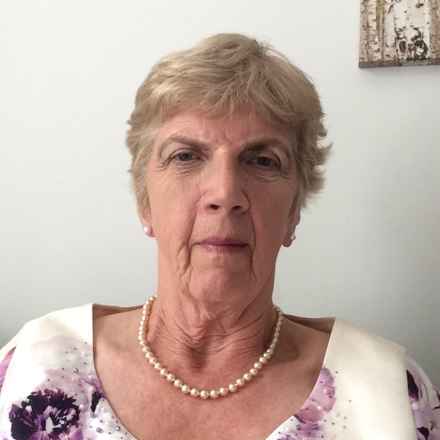“A befriender can help in so many ways”
Posted: Tuesday 01 November 2022
“I knew the impact that macular degeneration could have on people. I think the biggest sadness was that I was given that diagnosis, and then left without any real support, any information.
"So, from that day on, I decided I was going to make people aware of macular degeneration, how it affects you, physically, mentally, and emotionally, and other things alongside that, like Charles Bonnet syndrome.”
Christina was diagnosed with myopic macular degeneration in her mid 40s, while training to be a social worker, specialising in sensory impairment and sight loss.
Despite her professional experience, and the condition affecting her great grandmother, grandmother and father, it still came as a huge shock.
Now in her 60s, she said: “I can remember sitting crying so many times, and every autumn looking out at the gorgeous autumn colours, and thinking, ‘Will I see that next year?’ So it was more the emotional stuff, rather than the physical stuff, that I really struggled with. ‘Will I ever see my grandchildren? Will I be able to see them doing all these things, as they’re growing up?’.”
She added: “It was a very difficult time. Even though I’d been working in the field, as a professional, that diagnosis still hit me like a steam train, and it was almost a bereavement process I had to go through.”
In 2014 Christina became a volunteer befriender for the Macular Society, in her bid to continue to help others struggling to come to terms with a diagnosis.
“A befriender can help people in so many ways,” she said. “I think it’s a brilliant service, and I thoroughly enjoy doing that work. Being a befriender is about breaking up somebody’s boredom, and hearing somebody else’s tale, and offering them advice, if and when appropriate.”
She added: “People will break down in tears on the phone, and again, you’re saying, ‘This is normal. I’ve been a professional in the field, and even I can have days where I sit and just cry.’ But it’s absolutely thoroughly rewarding work, and most of the time you’re having fun and laughter. There’s only a small part that you have all the sadness. But a lot of it is just showing empathy, and concern, and listening, more than anything. The clients – I guess you could call them – almost become part of your family. They get to know you. You share a lot and it’s a two-way thing. It’s great.
As well as volunteering for the Society, Christina has helped raise vital funds by taking part in a wing walk, as a way of saying thank you for the support she, and others, have received.
She said: “I’ve chosen to raise funds for the Macular Society because of the amount of support I’ve had from them, and because of the amount of support I give others, as a speaker, and a befriender for the Macular Society.
“And I just think, if I can help towards some of the research, and some of the moving forward in technology that’s coming out of the Macular Society and the RNIB, then that’s where I want the money to go.
“Whenever I do good deeds, I say to people, ‘Please don’t thank me. Just you do that for somebody, yourself, in the future.’.”
Offering her advice to anyone struggling with a diagnosis of macular disease, she said: “I always say to people, you have to treat it as a rollercoaster, which it is, and it’s each day at a time. When you’re feeling low, accept that that is normal. And when I have people apologising because they’ve broken down in tears, I say, ‘Don’t apologise. This is normal. This is right. It's just part of the pathway’.
“It’s a road you have to walk, but you can walk it in a positive way, or you can walk with your head hung, and not see the world. I mean ‘see the world’ in a general term, not as a visual term. You can still enjoy the smells, and the sights, and the sounds of things, and it’s honing in on those other skills.”
Christina has shared her story as part of Befriending Week (1 - 7 November). If you are interested in becoming a volunteer, or would like to be matched with a befriender, visit our Befriending page or call us on 0300 3030 111 to find out more about the service.
